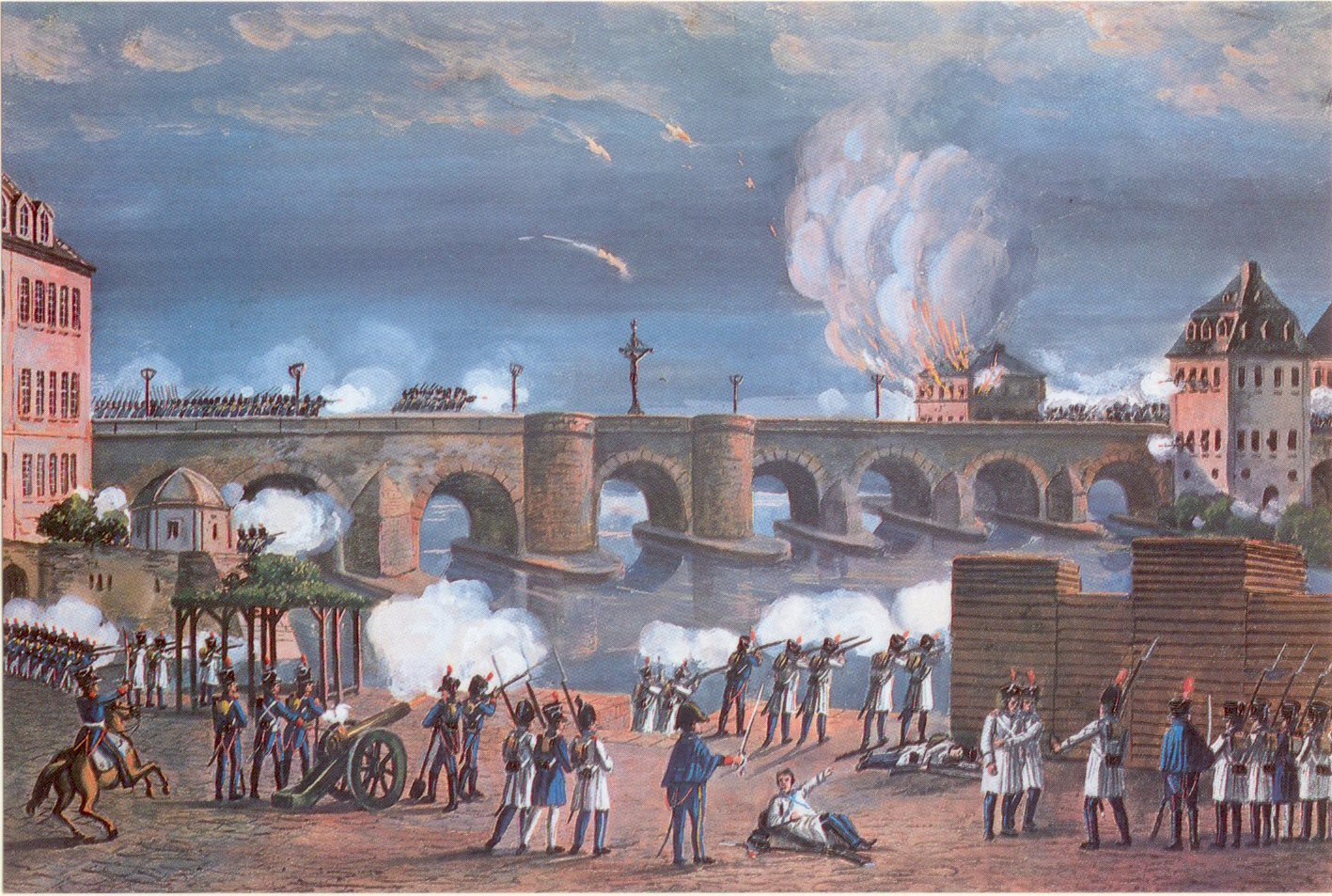Principality of Frankfurt on:
[Wikipedia]
[Google]
[Amazon]
The Grand Duchy of Frankfurt was a German

 Frankfurt lost its status as a
Frankfurt lost its status as a
satellite state
A satellite state or dependent state is a country that is formally independent in the world, but under heavy political, economic, and military influence or control from another country. The term was coined by analogy to planetary objects orbitin ...
of Napoleonic creation. It came into existence in 1810 through the combination of the former territories of the Archbishopric of Mainz
The Electorate of Mainz (german: Kurfürstentum Mainz or ', la, Electoratus Moguntinus), previously known in English as Mentz and by its French name Mayence, was one of the most prestigious and influential states of the Holy Roman Empire. In t ...
along with the Free City of Frankfurt
For almost five centuries, the German city of Frankfurt was a city-state within two major Germanic entities:
*The Holy Roman Empire as the Free Imperial City of Frankfurt () (until 1806)
*The German Confederation as the Free City of Frankfurt ...
itself.
History

 Frankfurt lost its status as a
Frankfurt lost its status as a free imperial city
In the Holy Roman Empire, the collective term free and imperial cities (german: Freie und Reichsstädte), briefly worded free imperial city (', la, urbs imperialis libera), was used from the fifteenth century to denote a self-ruling city that ...
in 1806 with the dissolution of the Holy Roman Empire
The Holy Roman Empire was a political entity in Western, Central, and Southern Europe that developed during the Early Middle Ages and continued until its dissolution in 1806 during the Napoleonic Wars.
From the accession of Otto I in 962 unt ...
. The city was granted to the former archbishop of Mainz, Karl Theodor Anton Maria von Dalberg
Karl Theodor Anton Maria von Dalberg (8 February 1744 – 10 February 1817) was Prince- Archbishop of Regensburg, Arch-Chancellor of the Holy Roman Empire, Bishop of Constance and Worms, prince-primate of the Confederation of the Rhine and Gr ...
, and became the Principality of Frankfurt. When Dalberg was forced by Napoleon to relinquish his Principality of Regensburg
The Principality of Regensburg (german: Fürstentum Regensburg) was a principality of the Holy Roman Empire that was created in 1803. Its capital was Regensburg. Following the dissolution of the Empire in 1806, the principality became a member ...
to the Kingdom of Bavaria
The Kingdom of Bavaria (german: Königreich Bayern; ; spelled ''Baiern'' until 1825) was a German state that succeeded the former Electorate of Bavaria in 1805 and continued to exist until 1918. With the unification of Germany into the German ...
in 1810, his remaining territories of Aschaffenburg
Aschaffenburg (; South Franconian German, South Franconian: ''Aschebersch'') is a town in northwest Bavaria, Germany. The town of Aschaffenburg is not part of the Aschaffenburg (district), district of Aschaffenburg, but is its administrative sea ...
, Wetzlar, Fulda
Fulda () (historically in English called Fuld) is a town in Hesse, Germany; it is located on the river Fulda and is the administrative seat of the Fulda district (''Kreis''). In 1990, the town hosted the 30th Hessentag state festival.
Histor ...
, Hanau
Hanau () is a town in the Main-Kinzig-Kreis, in Hesse, Germany. It is located 25 km east of Frankfurt am Main and is part of the Frankfurt Rhine-Main Metropolitan Region. Its station is a major railway junction and it has a port on the ri ...
, and Frankfurt were combined into the new Grand Duchy of Frankfurt.
Although the grand duchy was named after Frankfurt, the city was administered by French commissioners while Dalberg resided in the city of Aschaffenburg
Aschaffenburg (; South Franconian German, South Franconian: ''Aschebersch'') is a town in northwest Bavaria, Germany. The town of Aschaffenburg is not part of the Aschaffenburg (district), district of Aschaffenburg, but is its administrative sea ...
. According to the constitution of the grand duchy, upon Dalberg's death, the state would be inherited by Napoleon
Napoleon Bonaparte ; it, Napoleone Bonaparte, ; co, Napulione Buonaparte. (born Napoleone Buonaparte; 15 August 1769 – 5 May 1821), later known by his regnal name Napoleon I, was a French military commander and political leader wh ...
's stepson, Eugène de Beauharnais
Eugène Rose de Beauharnais, Duke of Leuchtenberg (; 3 September 1781 – 21 February 1824) was a French nobleman, statesman, and military commander who served during the French Revolutionary Wars and the Napoleonic Wars.
Through the second ma ...
.
Dalberg abdicated in favour of Eugene on 26 October 1813, following Napoleon's defeat at the Battle of Leipzig
The Battle of Leipzig (french: Bataille de Leipsick; german: Völkerschlacht bei Leipzig, ); sv, Slaget vid Leipzig), also known as the Battle of the Nations (french: Bataille des Nations; russian: Битва народов, translit=Bitva ...
. The grand duchy ceased to exist after December 1813, when the city was occupied by allied troops. While Frankfurt itself once again became a free city, most of the territory of the grand duchy was ultimately annexed by the Kingdom of Bavaria.
{{DEFAULTSORT:Frankfurt, Grand Duchy
States of the Confederation of the Rhine
Former states and territories of Bavaria
Frankfurt
Frankfurt, officially Frankfurt am Main (; Hessian: , " Frank ford on the Main"), is the most populous city in the German state of Hesse. Its 791,000 inhabitants as of 2022 make it the fifth-most populous city in Germany. Located on it ...
Grand Duchy
A grand duchy is a country or territory whose official head of state or ruler is a monarch bearing the title of grand duke or grand duchess.
Relatively rare until the abolition of the Holy Roman Empire in 1806, the term was often used in th ...
Former grand duchies
1810 establishments in Europe
1813 disestablishments in Europe